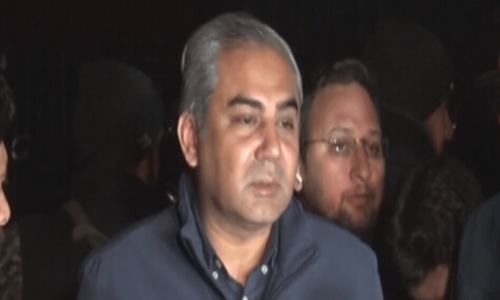ISLAMABAD: The Election Bill 2017, providing for complete financial and administrative autonomy and independence of the Election Commission of Pakistan (ECP), was introduced in the National Assembly on Monday.
The bill was introduced by Law Minister Zahid Hamid after the house condoned, on a motion moved by Finance Minister and Parliamentary Committee on Electoral Reforms chairman Ishaq Dar, a delay in the presentation of its report that was due in October 2014.
After the bill was tabled, the assembly also adopted the law minister’s motion seeking to dispense with the requirement of referring it to the standing committee concerned.
Explaining the salient features of the bill, Mr Hamid said the remuneration for the commissioner, members, officers and staff of the ECP and all its administrative and other expenditures would come from the federal consolidated fund.
Election bill introduced in National Assembly
He said an official appointed or deputed to perform election duties would be deemed to be under the discipline of the ECP.
Under the proposed law, the commission may, for reasons to be recorded in writing, suspend or withdraw any election official, public servant or any other person in the service of Pakistan who attempts to or obstructs or prevents the conduct of fair and impartial polls, tries to or interferes with a voter when he casts his vote, attempts to or influences the polling staff or a voter, does any other act calculated to influence the result of an election or disobeys or avoids to carry out any instructions issued by the ECP.
The minister said the ECP would have the power to make its own rules.
The bill provides for automatic enrolment as voter of a person issued a computerised national identity card on attaining the age of 18 years.
The candidates will get soft copies of the electoral rolls with photographs of the voters on them.
The polling staff will be appointed two months before the polls and will take the oath to work in accordance with the law and instructions of the ECP.
The distance between polling stations will not be more than 1km. The proposed law also provides for installation of surveillance cameras at polling stations declared sensitive.
It seeks to curb mushroom growth of political parties by making it mandatory for a new party to have at least 2,000 members and deposit a registration fee of Rs200,000.
If the turnout of women voters is less than 10 per cent, the ECP may declare void the polling at one or more polling stations or in the whole constituency. If the variation in the number of men and women voters in a constituency is more than 10pc, special measures will be taken by the ECP to address it.
The bill increases the limit of election expenses to Rs4 million for National Assembly, Rs2m for provincial assemblies and Rs1.5m for the Senate.
In case of failure to file an annual wealth statement, the ECP may suspend the membership of a legislator and if the default continues beyond 60 days, it will issue a show-cause notice for termination of the membership.
The commission will scrutinise the wealth statements and may order prosecution in case of a false declaration.
An interesting proposal in the bill is that in case of an equal number of votes obtained by two candidates, each will become a member for half term.
Persons with physical disabilities will be able to vote through postal ballot.
Published in Dawn, August 8th, 2017












































